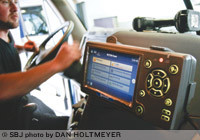After two years of gradual implementation, Springfield-based trucking company Prime Inc. has equipped all 4,000 trucks in its fleet with electronic logging systems, also called electronic on-board recorders.
By doing so voluntarily and at its own pace, Prime officials said the company stayed ahead of a gradual trend in the industry toward electronic logs, systems that monitor drivers’ compliance to rules governing drivers’ hours of service.
Among the rules enforced by the U.S. Department of Transportation’s Federal Motor Carrier Safety Administration, a driver cannot log more than 11 cumulative hours of driving a day following 10 consecutive hours off-duty and can “re-start” their weekly clocks after at least 34 consecutive hours off duty.
Drivers and trucking companies face fines for failureto follow the rules, all of which are aimed at improving safety.
Earlier this year, FMCSA proposed requiring nearly all interstate carriers to have electronic systems. At the time, the administration expected to put a rule in place this month with a three-year phase-in period. As of June 14, the change was still listed as a proposed rule on the FMCA Web site,
www.fmcsa.dot.gov.
The Qualcomm systems at Prime comprise on-board computer modules that sense trucks’ movements and record hours of driving.
That tracking previously was handled via paper records, and the switch improved efficiency, said Steve Field, log department manager at Prime.
“Paper logs were never as accurate as any of us would’ve wanted,” Field said. “With electronic logs, for the first time, we really have real-time, accurate information as far as how many hours a driver has available today to work."
If drivers don’t keep their logs current or are found to be driving over the hour limit at the time of a roadside inspection, they are cited for violations, Field said, noting that the switch to electronic logs has cut Prime’s roadside violations by at least 75 percent. The violations that still arise are less severe, he said.
With such improvement, “almost across the board, all your major carriers have already made the move to electronic logs,” Field said.
Field declined to disclose how much Prime spent on equipping the fleet with the e-logs, but he said the expense was minimal.
“The cost of the equipment was really not something we looked at,” he said.
The move from paper to e-logs is not without opposition within the trucking industry, however. While the American Trucking Associations cautiously supported the government proposal last month, the Missouri Trucking Association opposes mandatory use of electronic on-board recorders, said President and CEO Tom Crawford.
“It something that we’ve been monitoring and watching closely for I’d say about two years now,” Crawford said.
His organization last examined its policy a year ago and is set to look at it again this September at an annual membership meeting.
“If we make a change, that’ll probably be when it occurs,” he said, noting that as it stands, the MTA would want uniform application of a mandate to all carriers and a minimum of retrofit required.
The debate about e-logs manifested itself to a degree within Prime, at least initially, Field said.
“Some people were probably more in favor of it initially than others,” he said. “It’s been a big change for them from what they’re used to.”
After testing the logging systems, which are evolving from satellite to more Web-based, cell phone technology, most drivers came around, Field said, and the overall reception has been positive.
Trucks also have paper logs on hand in case electronic communication is disrupted, he said.
Springfield-based Steelman Transportation Inc., has taken a more guarded approach toward electronic logging, said Steelman President Jim Towery.
“We’re experimenting,” he said. “We’re being very careful to implement it.”
Steelman Transportation currently uses technology such as smart phones and laptops for its logging and tracking by dispatchers.
Only one Steelman trucker has switched to electronic on-board recording, Towery said, noting that electronic logs need to prove their flexibility with time pressures before Steelman Transportation makes a larger move in that direction.
The ideal flexibility, Towery said, includes being able to adjust to unplanned problems such as traffic jams or weather delays, obstacles that eat away at a driver’s time but don’t translate to distance covered.
“Those are issues that the industry needs to deal with,” Towery said.
Prime’s Field characterized the electronic systems as having black-and-white rules, holding to the 11-hour limit regardless of whether a driver has a place to pull off the road.
Even if a stop is just minutes away, the driver will be pegged by the electronic system for going over the limit.
“The real world is not black-and-white,” Field said. “It becomes a challenge, without a doubt.”
Though Towery anticipates a 5 percent to 7 percent dip in productivity for Steelman if the company follows the e-logging trend, he has seen some positive changes for the driver who converted to the on-board recording system.
The driver pays more attention to planning his trips, Towery said, noting that the increased attentiveness could hold true for other drivers, dispatchers and the industry as a whole.
“And electronic logs will level the playing field among all the carriers, which is a good thing,” Towery said, noting that paper logs allow some “fudge factor” or even outright cheating.
“We’re just looking for compatible systems,” he added.[[In-content Ad]]
